

Halloween : 10 choses qui font peur à un Rédacteur Web - Emarketing aux Petits Oignons. Histoire de rire un peu et de frissonner de concert avec ces choses qu’on voit hélas tous les jours dans la profession de rédacteur, je vous propose un article « snack content » comme on les aime !

🎃🧙👻 1) Un brief de Rédaction Web qui tient sur un post-it Pour vous faire fuir, il suffit qu’un client vous dise vaguement ce qu’il veut, qu’il ajoute un « on verra plus tard pour les détails », et termine par « de toute façon, il y aura les modifications si besoin ». Vous savez d’avance que ce client va vous prendre le temps et la tête. 2) Un prospect qui demande illico le prix au mot. Une efficacité limitée par l’éthique et l’économie – Le Neuromarketing.
Critiques éthiques L’une des principales critiques éthiques du neuromarketing est la question de la manipulation.
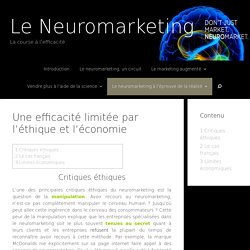
Avoir recours au neuromarketing, n’est-ce pas complètement manipuler le cerveau humain ? Jusqu’où peut aller cette ingérence dans le cerveau des consommateurs ? Cette peur de la manipulation explique que les entreprises spécialisées dans le neuromarketing soit le plus souvent tenues au secret quant à leurs clients et les entreprises refusent la plupart du temps de reconnaître avoir recours à cette méthode. The Behavioral Neuroscience of Motivation: An Overview of Concepts, Measures, and Translational Applications. Motivation, defined as the energizing of behavior in pursuit of a goal, is a fundamental element of our interaction with the world and with each other.
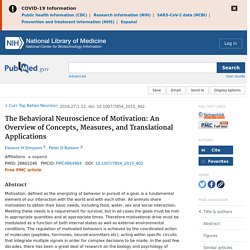
All animals share motivation to obtain their basic needs, including food, water, sex and social interaction. Meeting these needs is a requirement for survival, but in all cases the goals must be met in appropriate quantities and at appropriate times. Therefore motivational drive must be modulated as a function of both internal states as well as external environmental conditions. The regulation of motivated behaviors is achieved by the coordinated action of molecules (peptides, hormones, neurotransmitters etc), acting within specific circuits that integrate multiple signals in order for complex decisions to be made. Getting Beyond Small Talk: People Enjoy Deep Conversations With Strangers. Summary: People overestimate feelings of awkwardness when talking to strangers and underestimate the enjoyment of deep, meaningful conversations with those we have just met.
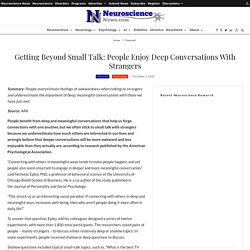
Source: APA People benefit from deep and meaningful conversations that help us forge connections with one another, but we often stick to small talk with strangers because we underestimate how much others are interested in our lives and wrongly believe that deeper conversations will be more awkward and less enjoyable than they actually are, according to research published by the American Psychological Association. Sounds and Words Are Processed Separately and Simultaneously in the Brain. Summary: Auditory and speech processing occurs in parallel in the brain, researchers report.
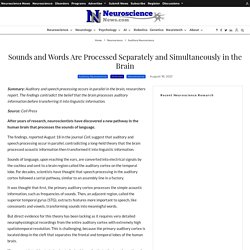
The findings contradict the belief that the brain processes auditory information before transferring it into linguistic information. Source: Cell Press After years of research, neuroscientists have discovered a new pathway in the human brain that processes the sounds of language. The findings, reported August 18 in the journal Cell, suggest that auditory and speech processing occur in parallel, contradicting a long-held theory that the brain processed acoustic information then transformed it into linguistic information. Sounds of language, upon reaching the ears, are converted into electrical signals by the cochlea and sent to a brain region called the auditory cortex on the temporal lobe.
8 Weeks of Meditation Studies Can Make Your Brain Quicker. Summary: Eight weeks of meditation training enhanced brain connectivity between the default mode network and the dorsal attention network, allowing participants to quickly switch between mind wandering states and focused attention.
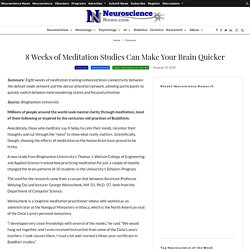
Source: Binghamton University Millions of people around the world seek mental clarity through meditation, most of them following or inspired by the centuries-old practices of Buddhism. Anecdotally, those who meditate say it helps to calm their minds, recenter their thoughts and cut through the “noise” to show what really matters. Scientifically, though, showing the effects of meditation on the human brain have proved to be tricky.
Simlish Is Less Distracting Than English in Background Music During a Conversation. Summary: Background music in Simlish, an unintelligible language used in the popular game The Sims, allow people to better listen to and understand each other than when the songs are in English, researchers say.
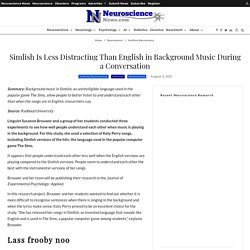
Source: Radboud University Linguist Susanne Brouwer and a group of her students conducted three experiments to see how well people understand each other when music is playing in the background. For this study, she used a selection of Katy Perry songs, including Simlish versions of the hits; the language used in the popular computer game The Sims. Our Brains Perceive Our Environment Differently When We’re Lying Down. Summary: When we lie down, our brains decrease reliance on information related to the external world and increase reliance on internal perceptions generated by the sense of touch.
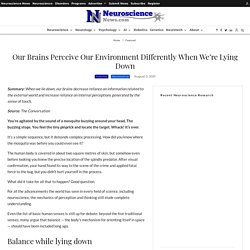
Source: The Conversation You’re agitated by the sound of a mosquito buzzing around your head. The buzzing stops. You feel the tiny pinprick and locate the target. Whack! Le cervelet et la mémoire – Mat Boulé, Osteopath, Posturologist, Educator. Si on pensait autrefois que le cervelet était fait pour le mouvement et que le cortex frontal était fait pour les fonctions cognitives, il est de plus en plus évident que ce n’est pas aussi noir et blanc.

Le Dr Nuo LI, professeur adjoint de neuroscience, a découvert la première preuve directe que le cervelet fait plus que contrôler l’activité musculaire. Il joue également un rôle dans les fonctions cognitives. Nous savions déjà que les lésions cérébelleuses étaient connues pour causer des problèmes de mémoire ou de planification. Li et ses collègues ont examiné l’activité du cervelet pendant les périodes où les animaux ne bougent pas mais réfléchissent.
Ce que Li et ses collègues ont découvert, c’est qu’alors qu’ils choisissaient encore comment bouger sans bouger, chez la souris, il y avait non seulement une activité dans le cortex frontal, mais également dans le cervelet. Le cerveau apprend plus facilement quand on écrit à la main. L’étude.

Les avantages de l'écriture à la main se feraient sentir dès les toutes premières expériences d’écriture. En effet, former des lettres ou des signes de la main active notre mémoire motrice. Écrire à la main ou avec un clavier : quelles conséquences sur notre cerveau ? Prendre un papier et un stylo pour se souvenir d’un rendez-vous, écrire une lettre, ou encore rédiger des notes à la main… tous ces gestes se font de plus en plus rares. Les Français ont modifié leurs habitudes avec la multiplication des nouveaux outils numériques et des claviers. Mais ces changements soulèvent une question : quels sont les effets sur le cerveau ? Une sollicitation différente. A la découverte du cerveau, cet inconnu. Les scientifiques prouvent que l’ADN peut être reprogrammé par nos propres mots – Nouveau Monde.